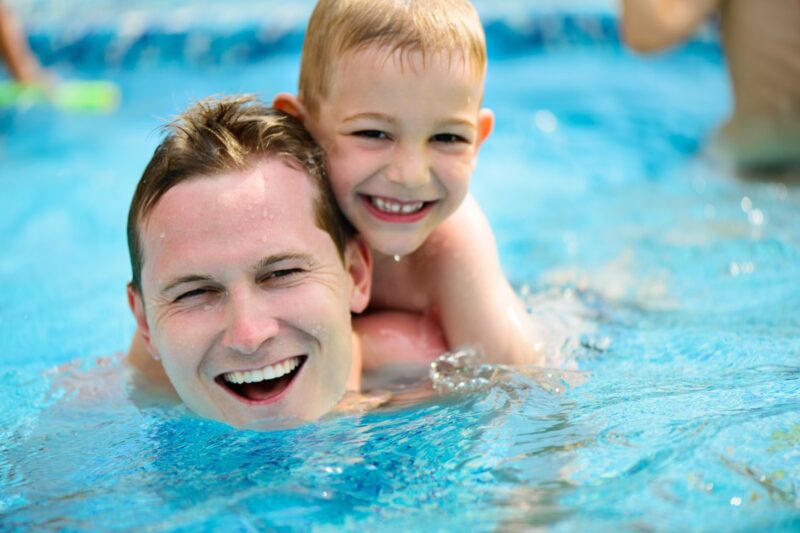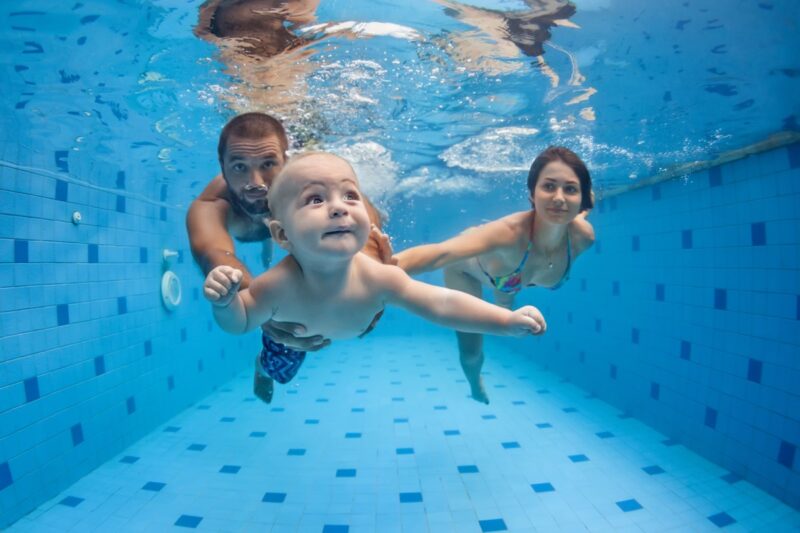
Sports and physical activities like swimming are great for building confidence in children! It teaches them about success and failure and gives them a passion for a new skill. Swimming is a solo activity and is easy for kids to learn young. Floating, diving and treading water independently show them that they can accomplish anything with hard work! Here 7 tips for building confidence in kids:
1. Let Them Make Decisions
Your child will love making choices on their own! This is true whether it’s choosing what toys to bring into the water or what game to play. You can make decision making fun by doing the following:
- Taking children through the process step-by-step
- Using “would you rather” questions to make it a game
You should always simplify the process for your children. Giving them only two options allows them to choose easier than a question without options.
According to Psychology Today, teaching your children how to make decisions at a young age helps them develop morals. Good decision-making comes with rewards while choosing the wrong comes with consequences.
2. Model Confidence Yourself
Lead by example with your children. Seeing a parent with confidence will show them what to do. Your kids learn everything from you. So remember:
- Confident parents make for confident children
- To use positive self-talk in front of your children
It’s not difficult to instill confidence in your children. All you need to do is show them, love, through day-to-day interactions.
Follow the advice of KidsHealth when it comes to building self-esteem. Give your child praise and encouragement and support them during tough times. Remember to acknowledge mistakes, but have an idea to do better next time.
3. Allow and Facilitate Play
Playtime is important for kids and teaches them how to solve problems. It builds their confidence, assertiveness and leadership skills. You can:
- Dive into the pool with your child
- Set an example in the water
Play-based learning is a key part of teaching young children. Try out of some of the games that we show in our video about getting in and out of the water! Check out our list if you are looking for more ideas!
Games like underwater humming, fishy in the middle, starfish tag and swimming through legs are good for experienced swimmers. Choose the ones that you think are appropriate for your child’s age and skill level.
4. Allow Them to Learn from Mistakes
From a float that won’t last to a dive turned into a belly flop, allow your child to learn from what went wrong. Avoid telling them everything that happened to let them figure out what happened themselves. Here are a few benefits of this technique:
- Learning from mistakes builds confidence and resilience
- Mistakes lead to self-assessment and adaptation
Trial and error give children the social and emotional building blocks to cope with life. Children should learn to trust themselves. This helps with things like controlling frustration and anger and getting out of their comfort zone.
Think about a time when you were afraid of something going wrong. It can help you stop your children from doing the same. Over time, they are going to learn to navigate the pool and the world on their own. This is another reason why they should build confidence through swimming.
5. Help Them Set Goals
Swimming like any skill takes plenty of practice. So sitting down with your child and setting realistic goals can help. Private swimming lessons focus heavily on this aspect of learning. These are some examples:
- Hold your breath underwater for 10 seconds
- Swim from point A to point B (ask your child to you from the stairs)
- Sit on the pool floor
- Jump into the pool
- Tread Water for 3 minutes
- Swim 5 laps in the shallow end
Adjust according to your child’s skill level. Goals should be attainable and realistic. Swimming should be all about celebrating the little victories.
Let’s talk about specific examples! Children new to the water should be happy about treading water for the first time. While more experienced ones should focus on how long they can tread water by timing themselves. It should be all about the child and their learning style!
6. Encourage Them
If your kids are struggling with swimming skills, you should always support them. This is the case whether they’re working on hilding their breath, floating, treading water or doing the front crawl. Here are our tips:
- Don’t let them get discouraged by setbacks
- Persevering leads to results and overcoming obstacles rather than giving up
Your children should know that you believe in them. You as a parent should support your child when they are ready to try again. Children in control feel strong and confident.
A study from Leiden University shows that negative feedback is not helpful for children under 12. Psychologist Dr. Eveline Crone revealed that the brains of eight-and-nine-year-olds reacted strongly to positive feedback and hardly at all to negative feedback. Build confidence in your kid using positive reinforcement!
7. Praise Perseverance
Swimming is a challenging sport that uses your whole body. So it’s good to recognize the time and effort that your child puts into it. Celebrate progress! Do this by:
- Making growth charts to track progress over months
- Taking videos of your child’s learning process
Sometimes children may not realize how far they have come. So by having ways to show them, they will recognize it.
Dr. Carol Dweck’s study shows that kids should be praised for effort instead of intelligence. Those praised for intelligence see themselves as failures after mistakes. While those praised for effort always kept working hard. Mistakes in children praised for intelligence dropped by 20% while the latter increased by 30%.
To Sum Up…
Building confidence in kids is all about patience and support. The independence, confidence and lessons learned from swimming. Knowing about success and failure is a key part of a child’s development. These tips will prepare your kids for the future.



